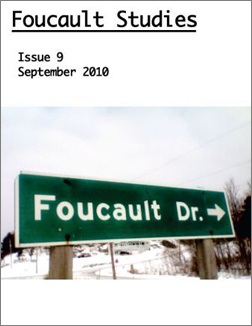Apparatuses of Animality: Foucault Goes to a Slaughterhouse
DOI:
https://doi.org/10.22439/fs.v0i9.3061Abstract
The work of Michel Foucault is not often considered in animal ethics discussions, but I believe that many of his insights can be fruitfully extended into this area of philosophical inquiry. In this paper, I present the slaughterhouse as a technology of power that is complicit in the domination and objectification of both human and nonhuman animal subjects. I begin by arguing that Foucault’s notion of an “apparatus” is a useful methodological tool for thinking about the constellation of spaces and discourses in which various bodies (both human and nonhuman) find themselves enmeshed. Next, I outline Foucault’s multifaceted conceptualization of “power,” and I consider whether it makes sense to think of other animals as implicated in “power relations” in the various Foucauldian senses. Finally, I analyze a journalistic account of a contemporary slaughterhouse. Here, I argue that a variety of hierarchies (spatial, racial, species, etc.) dovetail to create an environment in which care and concern are virtually impossible. By coupling a Foucauldian analysis with certain insights developed in the bioethical work of Ralph Acampora, I offer a normative critique of an institution that has pernicious effects on both human and nonhuman animals.Downloads
Published
2010-09-01
How to Cite
Thierman, S. (2010). Apparatuses of Animality: Foucault Goes to a Slaughterhouse. Foucault Studies, (9), 89–110. https://doi.org/10.22439/fs.v0i9.3061
Issue
Section
Articles
License
Authors retain copyright to their work, but assign the right of the first publication to Foucault Studies. The work is subject to a CC BY-NC-ND 4.0 license, but despite these restrictions, authors can take for granted that Foucault Studies will permit articles published in Foucault Studies to be translated or reprinted in another format such as a book providing a full reference is made to Foucault Studies as the original place of publication.



